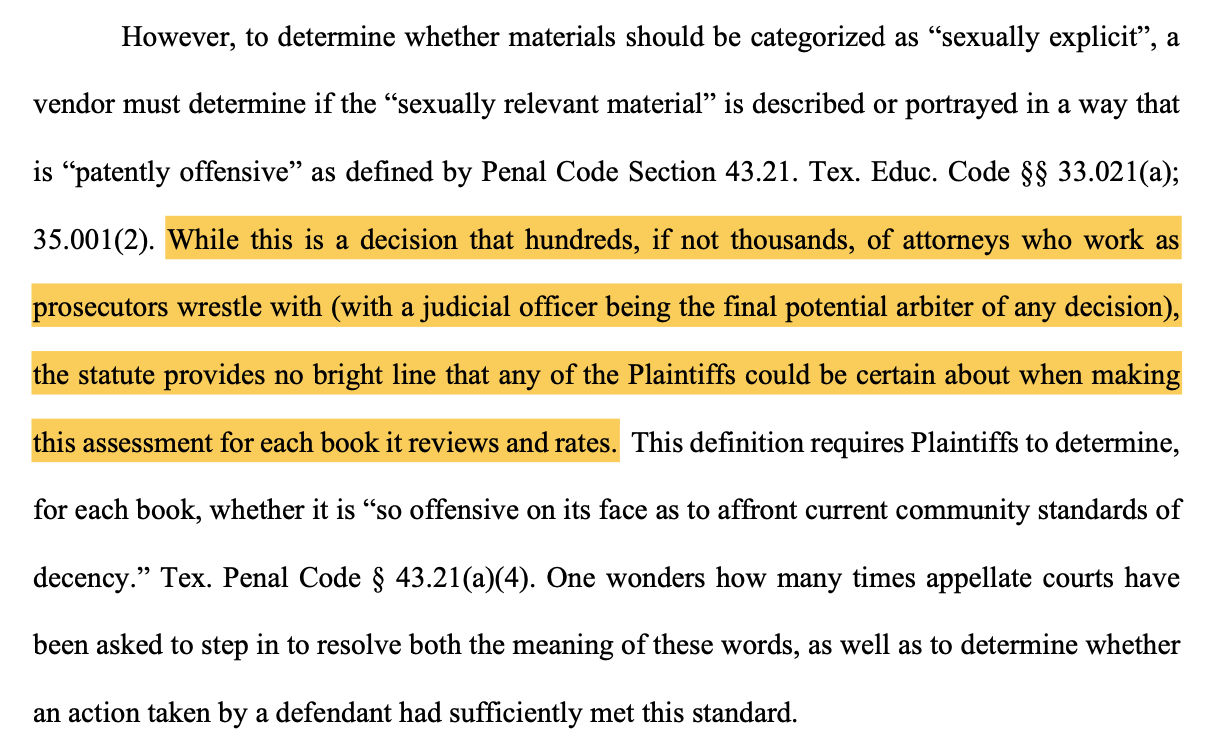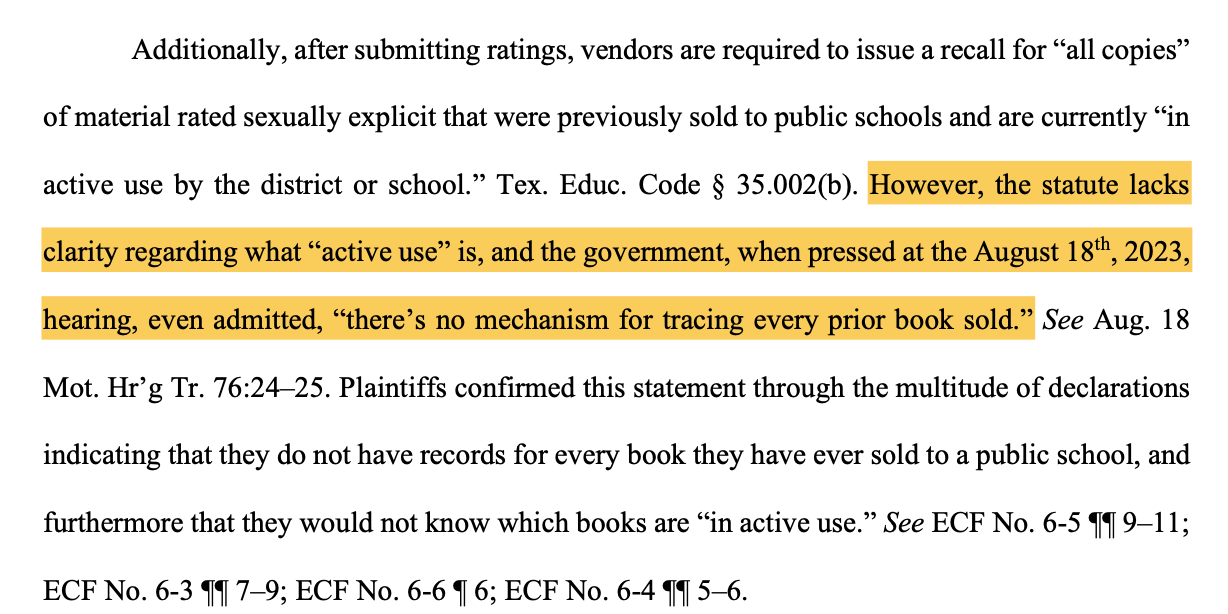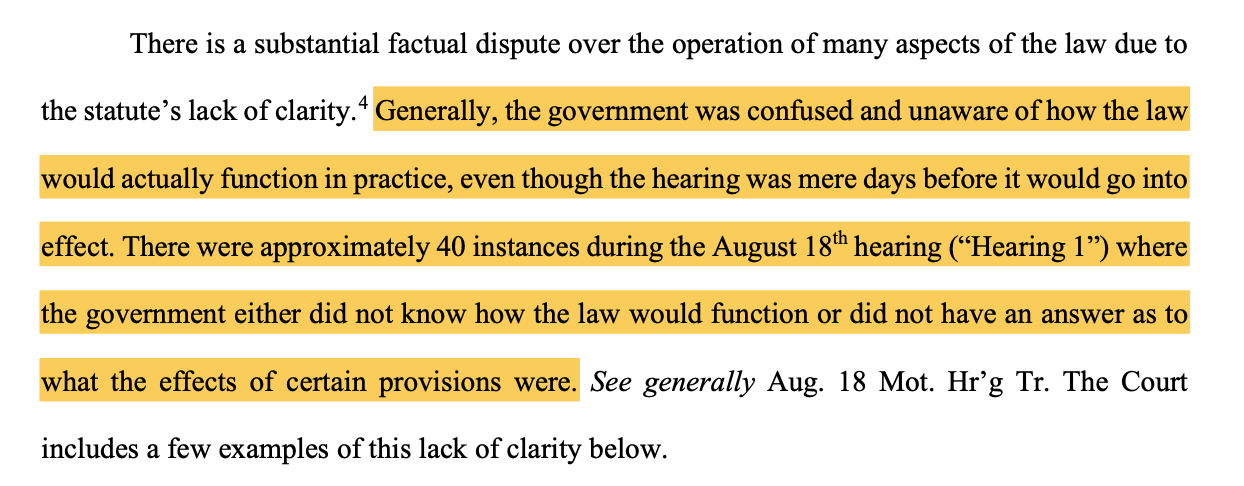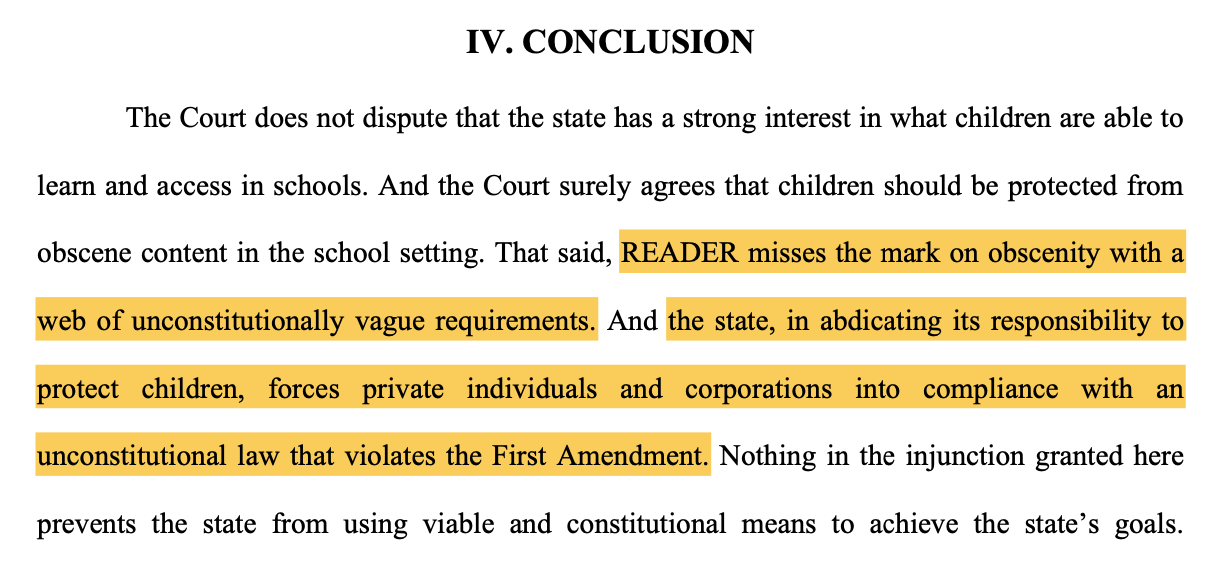https://www.lawdork.com/p/trump-appointed-judge-rips-texas?utm_source=post-email-title&publication_id=899862&post_id=137171045&utm_campaign=email-post-title&isFreemail=true&r=16jbk&utm_medium=email
~ recommended by emil karpo ~~
On Monday, a federal judge ruled in favor of booksellers who argued that Texas’s new law banning some books from public school libraries and restricting others through an onerous and complicated regime is likely unconstitutional in an opinion that blasted the law and the arguments the state made in its defense.
“[T]his Court has found that READER likely violates the First Amendment by containing an unconstitutional prior restraint, compelled speech, and unconstitutional vagueness,” U.S. District Judge Alan Albright — a Trump appointee to the federal bench — concluded in issuing a preliminary injunction halting state officials from enforcing the law. Texas already announced that it is appealing the decision.
The Restricting Explicit and Adult-Designated Educational Resources (READER) Act, H.B. 900, was passed earlier this year and purported to set up a system for categorizing books as “sexually explicit” or “sexually relevant,” with the former barred and the latter subject to restrictions, or unrated and available on unrestricted terms. The system, however, requires booksellers to do the initial rating by reviewing and rating every book that they sell to a school. A state agency is then free to change the rating of any book — with no apparent standards or way for the booksellers to appeal that decision — and then post the booksellers’ list (as potentially altered by the state) publicly. Failure to adhere to this system means you can’t sell books to schools in Texas.
“To put the scale of the number of books that would need to be rated in perspective, a librarian in San Antonio for Northside ISD testified that six school districts alone had library collections totaling over six million items,“ Albright wrote. There are more than 1,200 school districts in Texas.
Let’s just get this out of the way: Albright cannot believe this law exists. He also cannot believe the arguments the state made in its defense.
Let’s also get this out of the way: I enjoyed the hell out of myself reading this decision. Few governmental entities deserve such treatment more than the Texas Attorney General’s Office and Texas legislature.
That said, let’s dig in.
Law Dork covers legal challenges to state laws in depth. Subscribe today.
The law
Detailing the various standardless standards established in the law, Albright wrote, “READER’s requirements for vendors are so numerous and onerous as to call into question whether the legislature believed any third party could possibly comply.”
Albright explained the extensive, time-consuming, expensive process the law requires booksellers to undertake, applying unclear standards, to make a list rating all of the books they are selling to any schools.
All of that is only the beginning. Then, there’s the Texas Education Agency.
The TEA can change the rating as it wishes — with no apparent way to appeal or even seek review of that decision — and then post that changed rating as if the bookseller had made the decision. “[T]he statute provides the TEA unlimited authority to undermine every minute of the work that the vendors put into rating books without providing any blueprint for the standard that will be employed for this review,” Albright wrote.
“Plaintiffs are concerned that the state’s coerced revised ratings will be interpreted by the public as Plaintiffs’ own independent rating when they are, in fact, speech compelled by the State,” Albright stated, signaling quite clearly where he was going to be ending up.
Then, there are the consequences.
The booksellers either have to follow the new determination of the rating — “accepting the state administrative agency substituted speech as their own” — or be “effectively blacklisted” from school book sales in Texas (with additional potential reputational harm out of state).
Additionally, any books that are deemed banned (so, those rated “sexually explicit”) that were previously sold to any school are supposed to be recalled if still in “active use.”
The state’s defense
If Albright was unhappy with the law, he was even more dissatisfied with Texas’s defense of the law.
Albright then did that, like a teacher setting an example for children who just refuse to pay attention in (law) class.
On enforcement, who would enforce the law? “That's a good question. A good question that I don't know that anybody has thought that through yet.”
On when and why the TEA would change ratings: “I haven’t thought that through yet. I think this is still being worked out because this is a new [bill.]”
On whether there is no appeal from the TEA’s changed ratings: “I believe that’s correct, your Honor. I haven’t thought that through, but I do believe that is correct.”
On whether the booksellers could seek relief if harmed under the law: “Well, your Honor, maybe the answer is they can’t.”
Later, when discussing whether the plaintiffs have standing to challenge the law, Albright wrote, “If the Court accepts Defendants’ arguments that the certainty of the TEA reviewing Plaintiffs’ ratings or requiring any changes is so lacking that there is no ‘credible threat’ sufficient to confer standing, then apart from the requirements it imposes on vendors, READER is essentially pointless.”
In short, Albright poked at the state’s arguments at every turn, but with a level of aggressiveness not generally seen in court rulings — even those against a state law.
The legal rulings
As Albright made clear throughout, this law was not going to be enforceable by time he was done with it.
The ratings — and recall requirement — are not government speech, he found. Under the First Amendment, Albright went on to agree with the booksellers that the law unconstitutionally required compelled speech. In an interesting moment, Albright found that the law — which was widely expect to target, in part, books with LGBTQ content — was likely unconstitutional based on a trio of U.S. Supreme Court rulings about compelled speech in which the “LGBTQ side” of the argument had “lost,” including this year’s 303 Creative v. Elenis.
Of the argument from Texas that the booksellers have “no protected contrary message to what the government is requesting they speak,” Albright shot back, “This is patently false and incorrect.“
And, later, “This is textbook compelled speech.”
In perhaps his most clear summary of the issues at stake — and his view of them — Albright concluded:
Here, the government has failed to articulate any legitimate reason for requiring the vendors speak at all. The government has the power to do the contextual ratings for the books itself. The government has the power to restrict the ability of its school district as to which books it may purchase. The exercise of these powers must, of course, comply with the requirements of the constitution, but these are powers that should be exercised by the state directly. Not by compelling third parties to perform it or risk losing any opportunity to engage in commerce with the school districts.
In addition to the compelled speech ruling, Albright also found that “provisions of READER are unconstitutionally vague“ and that the “READER is an unconstitutional prior restraint.“
Specifically, as to the latter, Albright wrote, “READER is a prior restraint that acts as a prohibition of distributing literature—giving it a heavy presumption against its constitutional validity.”
As to the former, Albright found that the ratings section of the law is unconstitutionally vague, as well as another provision — called the “curriculum exception” — that exempts “library material directly related to the curriculum” from those rating rules. As with the poorly defined rules in the rating section of the law, Albright explained that the “curriculum exception” has similar — and potentially even worse(?) — problems:
The exception gives the impression of a straightforward rule that books used as a part of curriculum would not need to be rated. … But as discussed above, [the section of Texas law cited for the exemption] provides only a general list of subjects that curriculum must cover. And, even more importantly, curricula vary from day- to-day, year-to-year, and district-to-district—and are consistently being reevaluated.
In other words, it’s an exception that could either cover everything or nothing. Or both.
Albright granted the booksellers’ preliminary injunction, and enjoined the heads of the Texas Education Agency, Texas State Library, and Texas Board of Education — along with their employees (and attorneys) — “from applying, enforcing, or attempting to enforce, either criminally or civilly,” the relevant provisions of the READER Act.
What now?
It is important to note that Albright, repeatedly, tried to make clear that it was the state that screwed up here with how far it went — and that he might very well have been fine with alternative legislative proposals.
Again, the Court expresses no opinion on the scope of the power of a state to create a system where a state agency rates the sexual content of books that will be purchased by public school libraries. Nor does the Court express an opinion on the scope of the power of a state to utilize a rating system in determining whether to purchase a book or not for its libraries, as long as the rating is being performed by the state and not imposed on non-state actors. Those are questions for another day and a different statute.
In other words, as positive as this ruling is, it should be seen in the context of an absolutely out-of-control legislature in an overwhelmingly conservative state that has the constitutionality of its actions challenged in a federal judicial system that is increasingly deferential to far-right arguments.
The state, perhaps unsurprisingly, is appealing.
And though states often would be expected to appeal trial court rulings finding their laws likely unconstitutional, a ruling this harsh might, in another time, have led the lawyers at the AG’s Office to talk with their clients and even the legislature about maybe trying again next session with a new law.
Now, though, there’s always hope that this Trump appointee was the outlier and that Texas’s lawyers can convince at least two judges of a three-judge panel at the U.S. Court of Appeals for the Fifth Circuit that the injunction should be reversed. Then, as we’ve seen in other cases, Texas will take its chances at the Supreme Court — losing at times, but, also, winning at times. And, with those wins — and even some of the losses — pushing the law still further right.
Law Dork with Chris Geidner brings you independent, reader-supported legal and political journalism that seeks to hold government and other public officials accountable. Support this reporting by becoming a paid or free subscriber today.






No comments:
Post a Comment